| Srl | Item |
| 1 |
ID:
116357
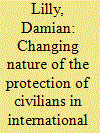

|
|
|
|
|
| Publication |
2012.
|
| Summary/Abstract |
The protection of civilians is a priority in most international peace operations today. There are important differences in the concept, however, in the operations undertaken for example by the UN, NATO, EU and the AU. In particular, a distinction needs to be made between the protection of civilians in 'peacekeeping' as compared to 'peace enforcement' operations. While in the former a 'proactive' approach to protecting civilians is usually adopted, in the latter a 'reactive' approach is normally required. These theoretical differences present important implications for those decision-makers mandating the operations as well as those involved in planning and implementing them in the field.
|
|
|
|
|
|
|
|
|
|
|
|
|
|
|
|
| 2 |
ID:
116355
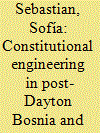

|
|
|
|
|
| Publication |
2012.
|
| Summary/Abstract |
This article reflects on the dynamics associated with state building in post-conflict Bosnia and Herzegovina (BiH) with a particular focus on the role of external agency. The debate over constitutional reform has featured prominently in BiH since the early 2000s. The objective of this reform was to transform Dayton into a functional institutional framework that prepared the country for both international withdrawal and EU integration. Based on a detailed analysis of two international initiatives launched in 2005 and 2009 this article analyses the reasons why constitutional engineering in post-Dayton BiH failed. More specifically, the article argues that this reform failed as a result of various shortcomings including international divisions; a democratic deficit inherent in the process; and the neglect of local conditions (including conflicting notions of the future form of the state by both local and external actors).
|
|
|
|
|
|
|
|
|
|
|
|
|
|
|
|
| 3 |
ID:
116356
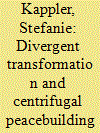

|
|
|
|
|
| Publication |
2012.
|
| Summary/Abstract |
This article problematizes the EU's approach to conflict transformation in its neighbouring countries, with specific reference to Bosnia and Herzegovina. It claims that the way in which the EU engages with domestic elites differs considerably from its engagement with the grassroots - an interaction that is heavily reliant on cooperation with civil society. This in turn produces a process of divergent transformation, creating further cleavages between elites and citizens. Emerging centrifugal processes obstruct the development of a common political platform for the citizens and represent an obstacle to the creation of a social contract in the peacebuilding context. This undermines the possibility of achieving sustainable peace and results in the transformation of past conflict into new conflict.
|
|
|
|
|
|
|
|
|
|
|
|
|
|
|
|
| 4 |
ID:
116354
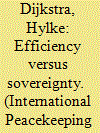

|
|
|
|
|
| Publication |
2012.
|
| Summary/Abstract |
This article analyses why the UN's members delegate resources to the UN Secretariat in the sensitive field of peacekeeping. It argues that the Secretariat can carry out planning and implementation functions more efficiently, but that the states remain wary of potential sovereignty loss. Through a mixed methods approach, this article provides evidence for such a functional logic of delegation, but shows that it only applies from the late-1990s on. The change in approach of states towards delegation can be explained by feedback from the dramatic failures of peacekeeping in Bosnia and Herzegovina, Rwanda and Somalia.
|
|
|
|
|
|
|
|
|
|
|
|
|
|
|
|
| 5 |
ID:
116353
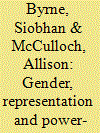

|
|
|
|
|
| Publication |
2012.
|
| Summary/Abstract |
An emerging tension characterizes conflict resolution practice: promoting power-sharing between ethnic groups while simultaneously mandating women's inclusion in peace processes and in post-conflict institutions. Scholars of ethnic conflict have not adequately theorized the gender implications of power-sharing, and practitioners have failed to implement mechanisms that would make power-sharing representative of constituencies beyond ethno-national cleavages. There is no substantive reason why the representation of women and ethnic groups should be in tension. Nevertheless, gender is often ignored in the power-sharing literature and gender-mainstreaming practices appear irreconcilable with power-sharing practice. Drawing on three cases of post-conflict power-sharing - Bosnia and Herzegovina, Burundi, and Northern Ireland - this article identifies reasons why this tension remains in practice, especially the overriding emphasis in power-sharing on ethno-nationalist elites and conflict protagonists.
|
|
|
|
|
|
|
|
|
|
|
|
|
|
|
|
| 6 |
ID:
116358
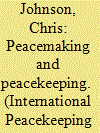

|
|
|
|
|
| Publication |
2012.
|
| Summary/Abstract |
Abyei was one of the most contested areas of Sudan's Comprehensive Peace Agreement (CPA) of January 2005. Drawing on direct experience, the article examines the agreement and the experience of trying to support its implementation. It analyses the relationship between this and the overall problems of the CPA, and of peacekeeping in the newly independent South Sudan. Drawing on relevant literature, it examines the wider issues for the negotiation of peace agreements; for UN mandates, including the protection of civilians; for the limitations of peacekeeping; and for the importance of continuing political engagement. It argues that in some situations smaller missions without a heavy military component might in fact achieve more.
|
|
|
|
|
|
|
|
|
|
|
|
|
|
|
|
| 7 |
ID:
116352


|
|
|
|
|
| Publication |
2012.
|
| Summary/Abstract |
This article investigates how influential policy advice constructs a stable Congo image and upholds the belief in intervention benefits. By investigating analytical blind spots and the way counter evidence is dealt with, this article shows that current policy papers imagine the Democratic Republic of Congo (DRC)'s economy, politics and society in a reductionist way. The economy is seen as criminal, illegal and unproductive. The state is portrayed as weak, despite obvious examples of its influence. Finally, society is seen as dominated by sexual violence. This 'functional pathologization' allows for self-referential reasoning about Western interventions, security sector reform for example, and serves as a recipe to perpetuate them.
|
|
|
|
|
|
|
|
|
|
|
|
|
|
|
|